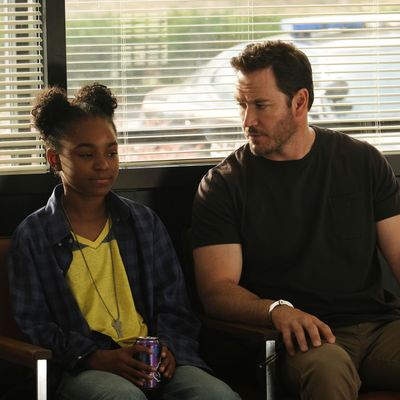
The Passage is a solid example of adequate network television. It’s not a great show, at least not based on the initial three episodes that were shared with critics for review, but it’s certainly not a bad one, either. It’s completely understandable that a person might become intrigued by and at least mildly invested in this drama, which is based on Justin Cronin’s sci-fi vampire novel of the same name and the two follow-ups it spawned. But the show’s shortcomings also reveal themselves within the first few minutes of the pilot, which debuts January 14 on Fox.
The problem with The Passage is one that plagues practically every network TV drama: a need to keep exposition and plot development flowing at all costs, particularly at the cost of nuance. This is especially true in the first episode, in which an avian flu outbreak, a massive government experiment, a startling discovery in a Bolivian cave, a young girl’s becoming an orphan, and the moment when that girl and a federal agent (Mark-Paul Gosselaar) intersect are all covered within the initial 15 minutes. You wish the adaptation, like its smart, sweeping source material, could just breathe for a few minutes so the audience could settle more deeply into the alternative America that Cronin so carefully conjured on the page. If The Passage had landed at an HBO or a Netflix, it might have had an easier time accomplishing that.
That said, in the second and third episodes, The Passage does a better job of slowing down and exploring the dynamics between its characters. The most crucial relationship is the one that develops between Gosselaar’s Brad and Amy Bellafonte (Saniyya Sidney), the 10-year-old who loses her mother to addiction, is placed in temporary care, then gets yanked out of her new home by Brad and another agent, who have been tasked with bringing her to Colorado. That’s the location of Project NOAH, the under-the-radar government lab where a vaccine is being tested that could make humans immune to all disease. Problem is that it has some side effects — not just constipation and dry mouth, but turning people into vampires who need to attack humans and drink their blood for sustenance. (I’m … guessing that wouldn’t meet FDA approval standards?) The folks at NOAH want Amy because they believe younger subjects are less likely to develop those side effects. How exactly they find her so quickly after she enters the foster care system is a bit of a mystery.
It’s one of a few logical gaps that The Passage leaps over in its race to keep its story-gears moving and its audience interested. (I swear, when I watch a lot of network television now, I can feel the underlying panic that viewers might get bored and switch over to Netflix.) In general, it’s actually moderately successful at that, thanks to the chemistry between Sidney, a promising young actress who appeared in Hidden Figures and American Horror Story: Roanoke, and Gosselaar, who is both gentle and authoritative as Brad, a man with his own personal motivations for becoming a father figure to this lost but sturdy girl. His desire to keep Amy safe immediately becomes the viewer’s desire as well.
Sidney and Gosselaar are surrounded by a cast of well-known TV faces, including Vincent Piazza (from Boardwalk Empire) as the agent who tasks Brad with retrieving Amy; Henry Ian Cusick (from Lost) as a scientist and co-creator of the vaccine; Jamie McShane (of Bloodline and dozens of other shows), as a backer of the vaccine who becomes its Patient Zero; Brianne Howey (of The Exorcist) and McKinley Belcher III of (Ozark and Mercy Street), as prison inmates recruited to become NOAH lab rats; and Emmanuelle Chriqui (of Entourage) as Lila, a doctor who happens to be Brad’s still-extremely-invested ex-wife. (She tells Brad she’s planning to marry her new boyfriend, yet is still able to drop everything at a moment’s notice to help the former husband she obviously still loves. It’s not clear how the potential fiancé feels about any of this.)
There are some relevant social issues embedded in all of The Passage’s vampire conspiracy business, most notably the way that the government uses humans deemed as “expendable” — criminals, young black orphans — in order to save the rest of the human race. So far, The Passage doesn’t seem likely to delve too deeply into any of that. But given that it was initially earmarked to become a feature film before being optioned as a television show — it has been developed for TV by Liz Heldens (who was a writer and producer on Friday Night Lights, and later created the shows Mercy and Camp) and is executive-produced by, among others, Matt Reeves and Ridley Scott — it has a better chance of matching the sweep and breadth of Cronin’s novels in episodic form than it would as a theatrical release.
Whether it will actually achieve that remains to be seen. Out of the gate, The Passage is a halfway-decent drama. But like any work of television these days, the question is whether it’s good enough to take precedence over every other show that’s not only on TV at the moment, but has been sitting on your list of “Things I Need to Watch” for the past several months or years.
So let me put it this way: If you’re sorting your TV priorities in a Marie Kondo-esque fashion, I would say The Passage doesn’t immediately spark joy, but that it shouldn’t be thrown away yet, either. Put it in that pile of things — i.e., the DVR — that you’re hanging onto and will make a decision about at a later date.


